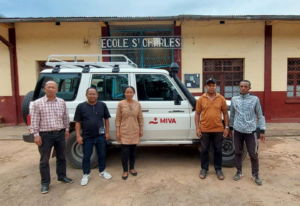In Madagascar, due to the lack of means of transport, animators cannot travel to reach the schools. As a result, the group of educators and teachers of the Marist Schools do not receive training. This affects the chances of children and young people to receive a better education. The problem of lack of training among educators and teachers has been solved thanks to the purchasing of a vehicle that will allow animators to visit all schools despite the distance and carry out the annual calendar of activities and training. Thanks to the training received by the educators, Marist Schools students could benefit from a better education. Educators need pedagogical and educational support to be able to supervise children in a better way and to provide them with quality education. The distance among Schools is great and most of the roads in Madagascar are in bad conditions.
AIM OF THE PROJECT:
For this reason, FMSI, thanks to the support of the Marist Brothers’ General Administration, the Maristen Solidarität International e.V. and the MIVA Austria, has implemented the Project “Improving educational mission and providing pedagogical assistance to the teachers and students of seven Marist Schools in Madagascar by acquiring a transport vehicle”. Project’s goal is to facilitate the mobility of animators to visit Marist schools in order to train educators and teachers on quality education. For educators who have been in the school for more than five years, teaching methods have changed and they need further training. Project’s direct beneficiaries are educators and teachers of the Marist schools in Madagascar. Indirect beneficiaries are 10.130 students. The design of the training program has been based on the demands of schools that have already involved educators. The implementation of the project took into account the expectations of participants in training. Animators have to travel to visit the 7 schools; for this reason, the mean of transport has been fundamental for the implementation of the project. Improving education is a way to fight poverty, especially in a Country like Madagascar. Animators worked with other organizations that are involved in the field of education. Marist Schools in Madagascar work with the Ministry of Education through CISCO and DREN (Organization of educational follow-ups by the government) and with the National Directorate of Catholic Education (DINEC) and Diocesan Directorate of Catholic Education.
Project is contributing to the achievement of Sustainable Development Goal No. 4, “access to quality education”, with a special focus on Target 4.c “By 2030, substantially increase the supply of qualified teachers, including through international cooperation for teacher training in developing countries, especially least developed countries and small island developing States”. Teachers are the key to achieving all the SDG 4 targets because the equity gap in education is exacerbated by the shortage and uneven distribution of professionally trained teachers, especially in areas in disadvantaged conditions.
The use of the car for educational purpose has solved some challenges that the Team had in the past:
- geographical distance, the schools are now unified in a single network, that is to say a certain uniformity must be applied in teaching practices;
- the lack of training among eucators and teachers will be resolved;
Thanks to the support received by the Donors, the impact of the project will be great in term of the quality of education for the 10.130 children in the Marist schools. The Marist Brothers have implemented the activities related to educational training in the schools and the project will contribute to the promotion of the Mission of the Marist Brothers in the Country.
THE PROJECT IN BRIEF:
The aim of the project is to facilitate the mobility of provincial animators to visit Marist schools in order to train educators and teachers who are able to deliver quality education.
THE PROJECT IN NUMBERS:
- 1 vehicle purchased
- 1 training team able to move around nimbly
- 450 teachers able to receive qualified training
- 7 schools involved
- 10,130 indirect beneficiaries (boys and girls)
SDG Goal: 4
Laudato Si’ Goals: 5, 7


